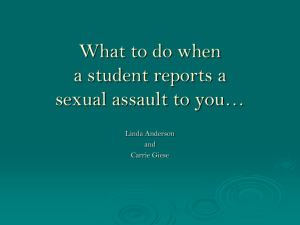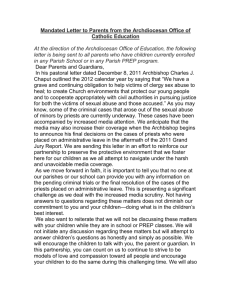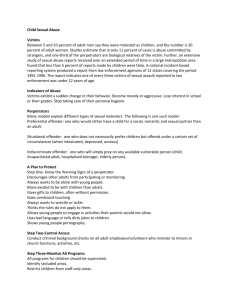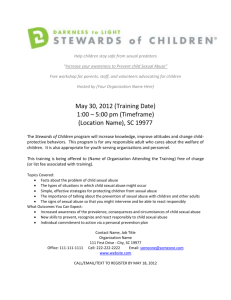Republic of Turkey’s contribution to the OHCHR Report on Information... Communications Technology and Child Sexual Exploitation
advertisement
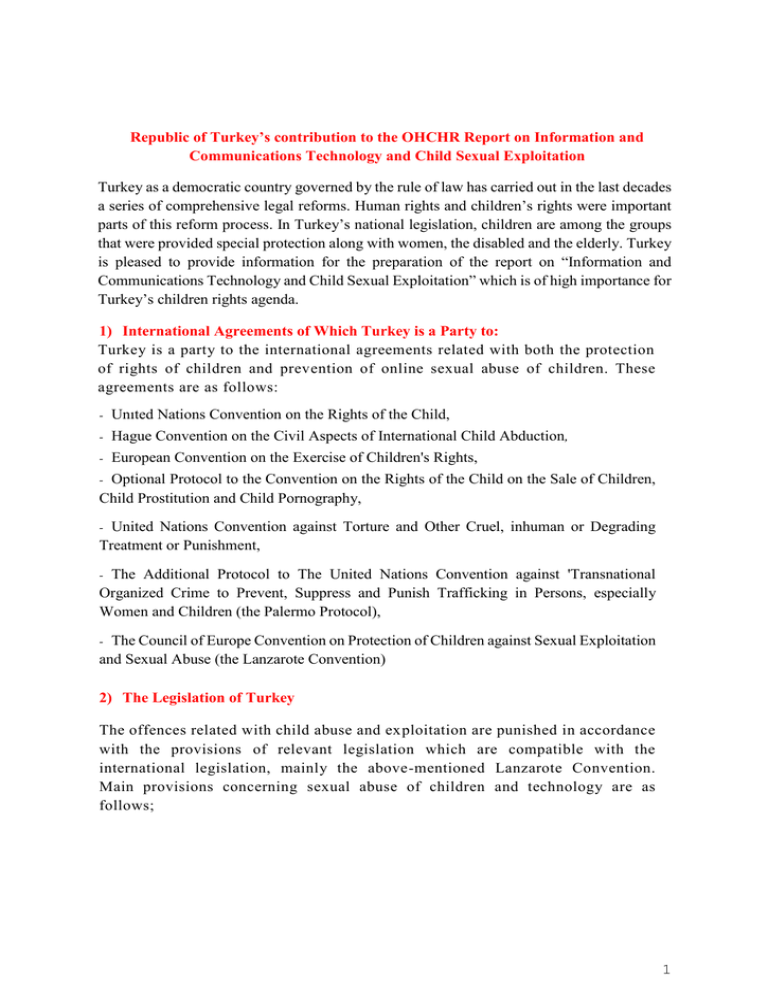
Republic of Turkey’s contribution to the OHCHR Report on Information and Communications Technology and Child Sexual Exploitation Turkey as a democratic country governed by the rule of law has carried out in the last decades a series of comprehensive legal reforms. Human rights and children’s rights were important parts of this reform process. In Turkey’s national legislation, children are among the groups that were provided special protection along with women, the disabled and the elderly. Turkey is pleased to provide information for the preparation of the report on “Information and Communications Technology and Child Sexual Exploitation” which is of high importance for Turkey’s children rights agenda. 1) International Agreements of Which Turkey is a Party to: Turkey is a party to the international agreements related with both the protection of rights of children and prevention of online sexual abuse of children. These agreements are as follows: - Unıted Nations Convention on the Rights of the Child, Hague Convention on the Civil Aspects of International Child Abduction, European Convention on the Exercise of Children's Rights, Optional Protocol to the Convention on the Rights of the Child on the Sale of Children, Child Prostitution and Child Pornography, - United Nations Convention against Torture and Other Cruel, inhuman or Degrading Treatment or Punishment, - The Additional Protocol to The United Nations Convention against 'Transnational Organized Crime to Prevent, Suppress and Punish Trafficking in Persons, especially Women and Children (the Palermo Protocol), - The Council of Europe Convention on Protection of Children against Sexual Exploitation and Sexual Abuse (the Lanzarote Convention) 2) The Legislation of Turkey The offences related with child abuse and exploitation are punished in accordance with the provisions of relevant legislation which are compatible with the international legislation, mainly the above-mentioned Lanzarote Convention. Main provisions concerning sexual abuse of children and technology are as follows; 1 a) Material Penal Provisions Sexual abuse of children Article l03(Amended: 18/6/2014-Article 6545/59) 1) Any person who abuses a child sexually is sentenced to imprisonment from eight years to fifteen years. If sexual abuse remains at the level of molestation, the offender is sentenced to imprisonment from three years to eight years. In case that the perpetrator of the offence, which remains at the level of molestation, is a child, the investigation and prosecution is carried out upon the complaint of the victim, parent or guardian. The term "sexual abuse" means as follows; a) All kinds of sexual attempt against children who are under the age of fifteen or against those attained the age of fifteen but lack of ability to understand the legal consequences of such act, b) Sexual attempts against other children only by force, threat, fraud or based on any reason affecting the will. 2) In case of performance of sexual abuse by inserting an organ or instrument into a body, the offender is sentenced to imprisonment not less than sixteen years. 3) İf the offence is committed; a) By more than one person, b) By benefiting from the opportunity provided with the environment in which many people have to live together, c) Against a person with whom he has third degree blood relation or kinship or by step father, step mother, step-sibling or adopting parents. d) By guardian, educator, trainer, nurse, foster family and other persons rendering health services and responsible from care, protection and observation of the child, e) By undue influence based on public office or public service, the punishments imposed according to above subsections are increased by one half. 4) In case of execution of sexual abuse against the children listed in paragraph (a) of first subsection by use of force or threat or against the children listed in paragraph (b) of first subsection by use of a weapon, the punishments imposed according to above subsections are increased by one half. 5) The provisions relating to felonious injury are additionally applied in case the acts of force and violence cause severe injury to the person subject to sexual abuse. 6) In case the offense results with death or vegetal existence of the victim, the offender is 2 punished with heavy life imprisonment. SexuaI harassment - Article 105 If a person is subject to sexual harassment by another person, upon the complaint of the victim, the person performing such act is sentenced to imprisonment from three months to two years or administrative fine. If the offence is committed against a child, the person performing such act is sentenced to imprisonment from six months to three years. (2) (Amended: 18/6/2014-Article 6545/61) If the offence is committed: a) By benefiting from the opportunity provided with public office or service or family relations, b) By guardian, educator, trainer, nurse, foster family and other persons rendering health services and responsible from care, protection and observation of the child. c) By benefiting from the opportunity provided through working in the same place, d) By benefiting from the opportunity provided with post and electronic communication tools, e) Through exhibition, the punishments imposed according to above subsections are increased by one half. If the victim is obliged to leave the business place, school or family for this reason, the punishment to be imposed may not be less than one year. Indecency - Article 226 (1) Any person who involves in an unlawful act; a) By giving a child products containing indecent images, writings or words or showing, reading those content to them or making them read or listen to those content. b) By displaying these products at places that children may enter or see. or showing them publicly or reading the contents of these products, or uttering or letting others to speak about them, c) By selling or leasing these product in such a way open to public access, d) By selling, offering or leasing these products at places other than the markets nominated for sale of these product, e) By gratuitously supplying or distributing these products along with other goods or services, f) By making advertisement of these products, shall be punished with imprisonment from six months to two years and also be 3 imposed punitive fine up to five thousand days (2) The persons who publicize indecent scenes, words or articles through press and broadcast organs or act as intermediary in publication of the same is punished with imprisonment from six months to three years also be imposed punitive fine up to five thousand days. (3) Any person who uses children in production of indecent scenes, words or articles is punished with imprisonment from two years to five years, and also imposed punitive fine up to five thousand days. Any person who engages in import, duplication, offering for sale, selling, transportation, storage, export, possession of these products, or presents the same to other's use, shall be punished with imprisonment from two years to five years, and also be imposed punitive fine up to five thousand days. e) Law No. 5651 “On Regulation of Publications on the Internet and Combating Crimes Committed By Means Of Such Publications” Law No. 5651 came into force on May 2007 to protect mainly children and family from illegal content of internet. In law no 5651 and its regulations, internet actors and their responsibilities are defined. Law combats with a number of specific crimes on internet which are also defined in Criminal Code. Moreover, Internet users can report a web site if they think one of the catalog crimes is committed via that web site. The most common subject of reporting is the crime related to sexual abuse of children. Consequentially, most of the effort and time are spent to deal with this crime. Along with the Law No. 5651, the following awareness activities are carried out: 1. For the conscious, safe and effective use of Internet, seminars were held to mainly families and children. 2. For the conscious, safe and effective use of Internet, many booklets and brochures are distributed to schools free of charge. 3. Web portals GuvenliWeb (guvenliweb.org.tr) and GuvenliCocuk (guvenlicocuk.org.tr) are designed to promote safer use of Internet. These portals are developed with a view to enable children to safely surf the cyber world. 4. Turkey’s Internet Hotline IhbarWeb which is a member of INHOPE (International Association of Internet Hotlines) has been established. 4 5. Safer Internet Service (SIS) is offered by Internet Service Providers. Thanks to SIS, families and children have the opportunity of protection against harmful and illegal content of Internet. SIS is a discretional and free of charge internet filtering service. 6. ICTA initiated a project with Ministry of National Education in order to instruct trainers on safer use of internet. Under this project, 82.000 teachers are trained. 7. A booklet titled “Guidelines for Preventing Cyber-Bullying in the School Environment: A Review and Recommendations” (an output of Working Group 3 of COST Action ISO801) was translated to Turkish by Turkish academicians and distributed by ICTA. 8. Ministry of Justice and the Supreme Board of Judges and Prosecutors participated in the "Justice Project for the Children" as a partner, which was organized in collaboration with UNICEF. Within the scope of the project, judges and public prosecutors who have duties regarding the child rights received a relevant training. On the dates of 12-13 November 20]4, a workshop on Prevention of Online Sexual Abuse of Children was held in Ankara by TAIEX. And the Ministry of Justice attended at ministerial level the Conference on Global Alliance Against Online Sexual Abuse of Children was first held in 2012 in Brussels. f) Child Protection System and Juvenile Protection Law No:5395 Child protection services are rendered to protect children against maltreatment, prevent health and development damages, ensure a safe environment to grow up, ensure optimum life chances and ensure a successful grow up for them. These services cover the activities for children who are damaged or at risk of damage. Juvenile Protection Law No: 5395 got into force in 15.07.2005 with an aim of protection and ensuring the rights and welfare of children in need of protection or children who are pushed into crime. Children in need of protection or children who are pushed into crime are rendered health, education, consultancy, care and shelter measures according to law. Services for children who are victims of sexual abuse/exploitation are rendered services in Child Support Centers. These centers are specialized and the children are under care and protection in these centers temporarily. A consultant (professional) is assigned for 10 children. The consultant helps the child in adoption process and informs the child about the center. ANKA Child Support Program has been applied in the centers since 2014 December. ANKA Child Support Program consists of Individual Risk and Needs Assessment Form (BIRDEF), Group Work, Individual Consultancy, Family Studies, Supportive Environment Components, 5 Guidelines of Approach for Supportive Personnel, institutional Approach for Crisis Intervention. Also it has individual modules of running away from home, self-injury, suicide, victim of abuse, crisis management and trauma. Group modules consist of 5 sections and 78 sessions. The subjects of the sections are: individual development, healthy living, emotional regulation, addiction. Individual development and healthy living is given for all children and the other three is given to children by considering their individual differences and needs. The studies is decided according to Individual Risk and Needs Assessment Form (BIRDEF). After three months the child is assessed again and appropriate service model is decided. All institutions where the children are under care and protection has filtering and internet safety so with URL filtering and by means of algorithm, access is denied for sites which have illegal contents (picture, image, virus, code, program). Following subjects are presented in the first strategic aim and activities of the sixth strategic purpose of National Child Rights Strategy Paper and Action Plan (2013-2017) which is “Developing support and special protection services for children and families”: Campaigns shall be organized to raise public awareness on preventing child abuse and neglect. Hence public service announcements, visual and written materials shall be prepared, conferences, meetings shall be held. Besides following subjects are presented in the first strategic aim and activities of the eighth strategic purpose of aforementioned Strategy Paper and Action Plan which is “forming a child-friendly media”: Exposing and misusing disabled or abused/neglected judicial cases in media by showing them miserable and aggrieved that is contrary to the media law shall be prevented. To minimize such misuse broadcasts, all administrative and legislative regulations shall be made, sanctions shall be aggravated. 6

